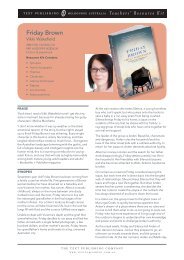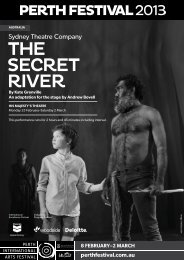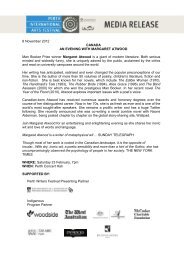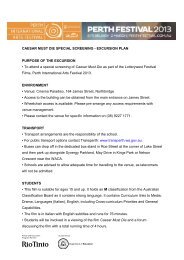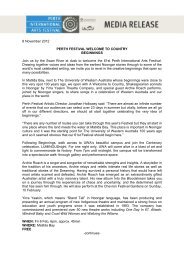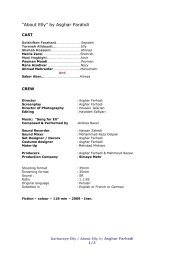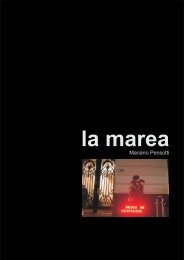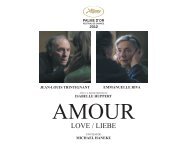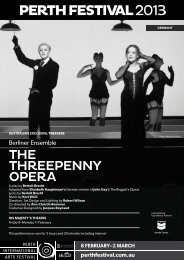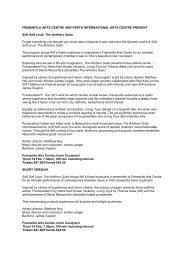kronos quartet
kronos quartet
kronos quartet
You also want an ePaper? Increase the reach of your titles
YUMPU automatically turns print PDFs into web optimized ePapers that Google loves.
Ram Narayan (b. 1927)<br />
Raga Mishra Bhairavi: Alap<br />
Arranged by Kronos Quartet, transcribed by Ljova<br />
Ram Narayan is one of the world’s most revered masters of the sarangi,<br />
the bowed string instrument from northern India renowned for its vocal<br />
expressiveness. Over the course of his long career, Narayan has been<br />
the person most responsible for bringing this ancient chordophone into<br />
the foreground of classical Hindustani music. Born in Udaipur, Rajasthan,<br />
Narayan grew up in a family of musicians, and began playing the sarangi as<br />
a child under his father’s tutelage. He began his career as a music teacher<br />
in Udaipur at age 15, then moved to Delhi in 1947 to work as a staff player<br />
at All India Radio. Like most sarangi players of the era, he played as a vocal<br />
accompanist only; however, he soon realised the potential of the sarangi as<br />
a solo instrument and pushed to bring his performances into the spotlight<br />
– a practice that was unheard of at the time. He moved to Bombay two<br />
years later to play in the burgeoning film industry and slowly pave the<br />
way for a solo career. In the early 1950s his ragas were some of the first<br />
to be recorded on LPs produced in India, and by the end of the decade<br />
Narayan became widely acknowledged as a soloist. Since then, he has<br />
received numerous awards, including the Sangeet Natak Academy Award,<br />
the highest honor issued in India for dance, music and theatre. Many<br />
innovations made by Narayan to bowing and fingering techniques on the<br />
sarangi have now become standard.<br />
Ram Narayan is known for his vivid interpretations of traditional Indian<br />
ragas. A specified combination of notes played and embellished<br />
within a parent framework called a thaat, each different raga has the<br />
power to evoke a unique emotional transcendence. This esthetic<br />
feeling was termed by music scholars as Rasavadhana: a mystic state<br />
completely unrelated to desire, which is purely compounded of joy and<br />
consciousness. This arrangement of Raga Mishra Bhairavi is based on a<br />
performance by Narayan, recorded in 1989.<br />
Ljova (Lev Zhurbin) is a composer, arranger and violist. Born in Moscow,<br />
he now works out of New York City. Ljova’s arrangements have been<br />
performed by the Kronos Quartet, Yo-Yo Ma’s Silk Road Project, Lara St.<br />
John, and many others. He has composed more than 70 works, including<br />
compositions for orchestras, chamber ensembles, jazz and Latin bands, as<br />
well as over a dozen scores for film and theatre projects. Recent commissions<br />
include orchestral works for the Staten Island Symphony, the Wild Ginger<br />
Philharmonic and the New York Symphonic Arts Ensemble, as well as a<br />
chamber music commission from the American Composers Forum.<br />
The Kronos Quartet’s arrangement of Raga Mishra Bhairavi by Ram Narayan was<br />
commissioned for Kronos by Deborah and Creig Hoyt in memory of Raymond Frase.<br />
Kronos’ recording is available on Floodplain, released on Nonesuch Records.<br />
Aleksandra Vrebalov (b. 1970)<br />
… hold me, neighbor, in this storm … (2007)<br />
Vrebalov’s works have been performed by the Kronos Quartet, the Cabrillo<br />
Festival Orchestra, Jorge Caballero, the Sausalito Quartet, Dusan Tynek<br />
Dance Company, Ijsbreker, and the Moravian Philharmonic, among others.<br />
Her music has been recorded for Nonesuch and Vienna Modern Masters.<br />
In 2005, Lila was premiered in Weill Recital Hall at Carnegie Hall by<br />
violinist Ana Milosavljevic. The premiere of the orchestral work Orbits<br />
opened the 30th Novi Sad Music Festivities and was broadcast live on<br />
national television, on the NS Channel. The same channel produced a<br />
30-minute television biography of Vrebalov. That year, she also worked<br />
on the score for Sleeping Beauty, an experimental film introduced at New<br />
York City’s Anthology Film Archives.<br />
About …hold me, neighbor, in this storm…, Vrebalov writes:<br />
The Balkans, with its multitude of cultural and religious identities, has had<br />
a troubled history of ethnic intolerance. For my generation of Tito’s pioneers<br />
and children of Communists, growing up in the former Yugoslavia meant<br />
learning about and carrying in our minds the battles and numberless<br />
ethnic and religious conflicts dating back half a millennium, and honoring<br />
ancestors who died in them. By then, that distant history had merged<br />
with the nearer past, so those we remember from World War II are our<br />
grandparents. Their stories we heard firsthand. After several devastating<br />
ethnic wars in the 1990s we entered a new century, this time each of us<br />
knowing in person someone who perished. As I write this in November<br />
2007, on YouTube a new generation of Albanians and Serbs post their warsongs<br />
bracing for another conflict, claiming their separate entitlements to<br />
the land and history, rather than a different kind of future, together.<br />
Strangely, the cultural and religious differences that led to enmity in<br />
everyday life produced – after centuries of turbulently living together – most<br />
incredible fusions in music. It is almost as if what we weren’t able to achieve<br />
through words and deeds – to fuse, and mix, and become something better<br />
and richer together – our music so famously accomplished instead.<br />
… hold me, neighbor, in this storm … is inspired by folk and religious music<br />
from the region, whose insistent rhythms and harmonies create a sense<br />
of inevitability, a ritual trance with an obsessive, dark energy. Peaceful<br />
passages of the work grew out of the delicately curved, elusive, often<br />
microtonal melodies of prayers, as well as escapist tavern songs from the<br />
region, as my grandmother remembers them.<br />
For me, … hold me, neighbor … is a way to bring together the sounds of<br />
the church bells of Serbian orthodox monasteries and the Islamic calls for<br />
prayer. It is a way to connect histories and places by unifying one of the<br />
most civilised sounds of Western classical music – that of the string <strong>quartet</strong><br />
– with ethnic Balkan instruments, the gusle [a bowed string instrument]<br />
and tapan [large double-headed drum]. It is a way to piece together<br />
our identities fractured by centuries of intolerance, and to reach out and<br />
celebrate the land so rich in its diversity, the land that would be ashen,<br />
empty, sallow, if any one of us, all so different, weren’t there.<br />
Aleksandra Vrebalov, a native of the former Yugoslavia, left Serbia in 1995<br />
and continued her education in the United States. She holds a doctorate<br />
from the University of Michigan, where she studied with Evan Chambers<br />
and Michael Daugherty, and a master’s degree from the San Francisco<br />
Conservatory, where her teacher was Elinor Armer. She has participated in<br />
numerous masterclasses and workshops, such as the New York University<br />
Summer Composition Workshop, Music Courses in Darmstadt (Germany),<br />
Szombathely (Hungary) and Kazimierz Dolny (Poland) in collaboration with<br />
IRCAM, and the Cabrillo Festival in Santa Cruz, California. She now teaches<br />
at the City College of New York.<br />
Aleksandra Vrebalov’s ... hold me, neighbor, in this storm... was commissioned for the<br />
Kronos Quartet by Carnegie Hall and by the Clarice Smith Performing Arts Center at<br />
Maryland with funds from The Leading College and University Presenters Program of the<br />
Doris Duke Charitable Foundation. Additional support was provided by The James Irvine<br />
Foundation. Kronos’ recording is available on Floodplain, released on Nonesuch Records.



